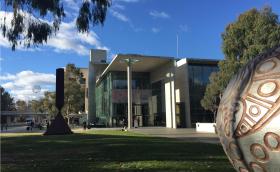The resignations of Queensland Art Minister Ros Bates and of her friend and appointee, consultant Kaye Martin, raise troubling questions for all who care about the arts.
During a period of profound disruption, slashed arts budgets and the loss of respected senior managers those making the calls lacked both experience and objectivity in both the art and screen sectors. Personal favours and conflicts of interest are salt in the wounds of an arts sector facing deep cuts.
There are two issues plaguing the Queensland arts sector: cuts and competence. Cuts seem inevitable given the political enmity that the LNP Government apparently bears the arts sector, which thrived under the Bligh Labour Government. Lack of competence need not be.
Artists and arts organisations are dependent on the judgement of grant givers. Filmmakers are dependent on the impartial assessments of development directors. Community arts programs and those who run them are dependent on employment. Both within Arts Queensland and Screen Queensland these judgements must now be called into question.
Bates – who had already been under the spotlight for nepotism over the appointment of her son Ben Gommers to a high paying job in the Department of Transport and Main Roads – gave three jobs to her friend Kaye Martin.
The first was as a consultant to the Department of Science, Information Technology, Innovation and the Arts where she was apparently paid $50,000 to review the whole department. Martin, owner and director of Allegro Investments, is a financial consultant who lists her skills as corporate consulting, investments and real estate. The second job was as a board member of Screen Queensland. The third job was in direct conflict-of-interest with the board appointment. Martin was given another consultancy, this time at Screen Queensland, where she was reportedly paid $1500 a day. She has argued that this was an internal Screen Queensland decision, which did not involve the Minister.
Senior public servants say people within the Department were ‘gobsmacked’ by the appointment of a person with no arts experience to the first consulting role. They commented that Martin was in the Department for some months taking benefits such as free tickets.
No one whom ArtsHub contacted had seen either the brief she received, or the report she produced – both of which ought surely to be made public in the light of what has happened in the past week.
But they don’t blame Martin for the cuts that followed. She had a brief in a Government bent on reducing funding to the arts. ‘She was there to watch the Minister’s back,’ one source said.
In fact Martin had surprised some arts people by defending the arts in a hostile financial environment. ‘She fought our patch so she wasn’t a total blight on the landscape.’
Minister Bates on the other hand was seen as having little understanding of her portfolio. At a State of the Arts forum only a week before she resigned, she told appalled arts industry professionals that ‘$5,000 is a lot of money to a small organisation’. ‘She thinks she is dealing with P and C committees and school fetes,’ said one.
At the Forum Bates announced an Arts Industry Advisory Board to oversee the sector and ‘achieve the best economic, artistic, social and cultural returns for the community’. With the exception of Professor Sue Street, the members are all people with experience in the private sector and finance but with no demonstrable knowledge of the funded arts sector.
With $12 million of cuts on the horizon, many are concerned that small to medium organisations will be devastated while major institutions are forced to tread water. Arts organisations feel they are being treated like welfare recipients wanting handouts, not a professional industry with value to deliver to the State.
Public sector employees are naturally cautious about commenting on political machinations but the fact that no one in the Queensland arts sector was willing to comment on the record about the resignations is an indication of the broader culture of fear that now pervades the Queensland arts industry.
People in funded positions have been living on a knife edge for 12 months, not knowing whether they will still have a job or whether their organisations will continue. The reassuring Bates did at the State of the Arts Forum is now looking anything but reassuring.
The silver lining is a fresh Minister, Ian Walker, untainted by questions of competence and cronyism. He is unlikely to be feted by the arts community given the main tool he has been handed is a knife – but he at least has a chance of being respected.
His first task will be to restore the transparent decision-making which is essential to public confidence in the funding of the arts.






